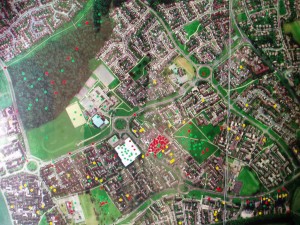Luton was the focus of the Channel 4 News piece ‘Changing Britain‘ aired on Tuesday 23rd March.
On the streets of Luton and in the context of it’s pronounced industrial and migrant history, Jon Snow’s report examined crime, unemployment and the benefit’s trap, and inviting local perspectives on the upcoming elections.
The Snowblog ‘Hats off for Luton’, published prior to the broadcast, recognises Luton as “merely the tip of a very British reality, a snapshot of a country with vast social challenges extending far beyond what we mainly talk about – fixing the deficit.”
Glenn Jenkins (who extends the discussion in A view from the Marsh Farm estate) and other Marsh Farm Outreach members also feature in the programme. Spectacle have been working with the group for over 15 years, most recently on our Poverty and Participation in the Media project for the Joseph Rowntree Foundation, but also during the early community activism and outreach principles of the Exodus Collective (now Leviticus and MFO), about whom Spectacle produced two films Exodus Movement of Jah People and Exodus from Babylon.

